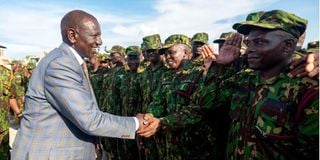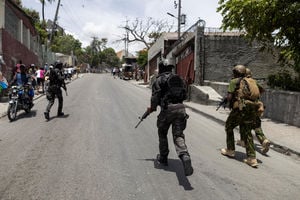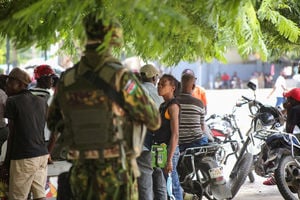
President William Ruto shakes hands with Kenyan police officers when he arrived in Port-au-Prince, Haiti.
Kenya says it will deploy the remaining 618 police officers to Haiti to complete its pledge of 1000 troops to the Caribbean country, by January next year.
This is in spite of ongoing discussions to renew the mandate of the UN-backed Multinational Security Support (MSS) mission to Haiti or adjust its structure to become a formal peacekeeping mission.
On Thursday, President William Ruto told the UN General Assembly that Nairobi wants to fulfil its part of the bargain for the MSS that could have up to 2500 police troops when other countries fully deploy.
Kenya already has 382 police officers deployed in Haiti since June where they have been working alongside Haitian national police officers to combat gang violence in major cities.
At his third speech at the UN General Assembly since he got to power, Ruto spoke of Kenya’s unwavering commitment to contribute to world peace and security, citing Haiti, Somalia and the general UN peacekeeping missions as places Kenya has contributed troops. Except Haiti’s isn’t a peacekeeping mission in its strictest definition.
When the UN Security Council passed a resolution authorising the Kenya-led mission, it said its funding and capacity should be based on a voluntary contribution by member states. It meant the MSS could not draw from UN funding as peacekeeping missions often do.
That has become the MSS’s continual problem as troops have faced funding challenges as well as a lack of sufficient equipment to go after gangs. The US, Canada, France and the UKL had pledged to provide money or material support. Washington had indicated it will pump in some $300 million in financial and material support.
“I appeal to all member states to stand in solidarity with the people of Haiti by providing necessary support, either directly to MSS-contributing countries or through the UN Trust Fund.
“I must emphasise, however, that Kenya will deploy the additional contingent towards attaining the target of all 2500 police officers by January next year,” President Ruto said in his speech to the UNGA.
The MSS faces another uncertainty: Its mandate. Passed in October last year, the resolution authorised a year-long deployment. But these troops were only deployed four months to the end of the mandate. Traditionally, such missions have often been deployed at least for two years, suggesting the UN Security Council could yet extend it.
Nairobi has, however, recently argued for a change of structure, from a voluntary-funded mission to a peacekeeping mission that will be certainly funded from the UN coffers.
That proposal had been raised before when discussing the resolution last year, but some members of the Council argued against it, seeing that Haiti had previously had UN-funded missions that ended up hurting the country more than helping.
Infested by gangs, Haiti’s political life has often been punctuated by assassinations, coups and violence, in spite of being the first black-majority country to earn independence from the Western hemisphere in January 1804.
Once Kenya finishes its bit of deployment, it will hope other countries will fill in the 1500 troops. Jamaica, Bahamas, Guyana, Barbados, and Antigua and Barbuda, as well as Bangladesh, Benin, and Chad, had pledged to send too.
So far, only Jamaica has sent two dozen soldiers and police officers to join the Kenyan contingent in the fight against the powerful gangs that have largely been controlling Haiti’s capital Port-au Prince since the assassination of the country’s 43rd President, Jovonel Moise in July 2021.
Despite receiving financial support and equipment from the US, Canada and a few other countries, President Ruto explained that insufficient funding continues to delay the deployment of officers by other countries and urged more UN member states to support the mission.
The Head of State also gave an update on the current situation in Haiti following his visit to the country last week and commended Haiti’s National Police and the Kenyan team for pacifying cities and towns, protecting infrastructure and relieving many communities previously held captive by criminal gangs.
Whereas the situation in the Caribbean country is getting better, President Ruto noted with concern the increasing incidents of conflicts and warfare across the world and criticised the “world’s most powerful states” for increasingly choosing unilateralism and militarisation over dialogues and diplomacy.
He was referring to the pervasive conflicts ongoing in Gaza, Lebanon, Russia, Ukraine, Sudan as well as Yemen — each leaving trails of destruction that threaten global stability. Even worse, the intensification of great power rivalries has exacerbated regional tensions, leading to a deteriorating international security architecture.
This lacklustre response by multilateral institutions, he explained, has greatly hampered the capacity of the world powers to maintain and enforce peace even during crises with significant regional impacts.
“As a consequence, the capacity of our multilateral institutions to maintain and enforce peace, even in national crises with significant regional impacts, is severely undermined. Even worse, a resurgence of a nuclear arms race, buoyed by the intensifying geopolitical rivalries and tensions, has made the possibility of catastrophic nuclear warfare a real possibility,” he said.
President Ruto called on the UN member states to intentionally rise to the occasion and meet the current challenges by reaffirming the core values of the UN Charter.
The intensification of great power rivalries has further exacerbated regional tensions, leading to a deteriorating international security architecture.
“We need to muster political will and collectively reinforce our diplomatic efforts to confront the security threats through comprehensive, multipronged and context-specific approaches,” he said.
He reiterated Kenya’s commitment to promoting peace and security through contributing to regional peace operations such as its participation in the African Union Transition Mission in Somalia and other UN peacekeeping missions.
Whereas efforts are being made to improve the state of peace and security, President Ruto condemned the existing international security architecture, represented by the UN Security Council which he said “continues to hamper efforts to maintain international peace and security.”
This, he said, was due to the Council’s structure that allows only one African nation to have powers to veto decisions made by other UN member states. The US, Russia and China have lately backed the inclusion of African countries among the permanent members. But the US in particular doesn’t want new permanent members to gain the veto power.
“The Council is dysfunctional, undemocratic, non-inclusive, unaccountable, autocratic, and opaque. An institution that excludes 54 African countries, representing 1.4 billion people, while allowing one nation to veto the decisions of the remaining 193 member states is unacceptable. We must urgently seek to make the Security Council truly representative, inclusive, transparent, effective, and accountable,” he said.










